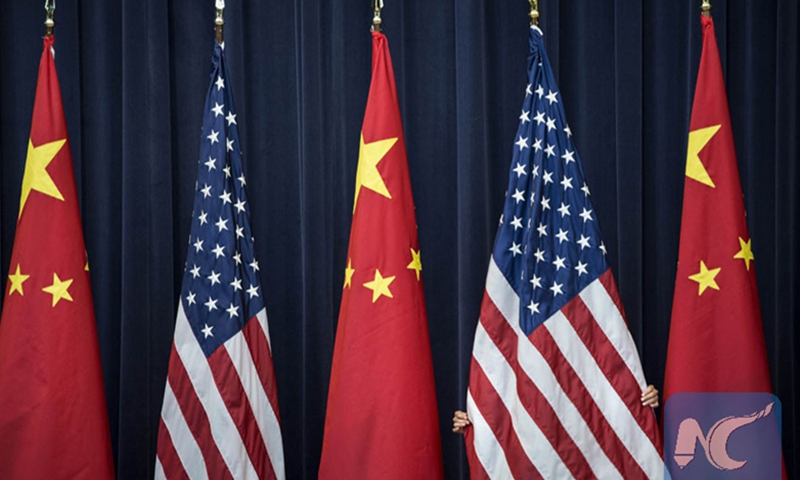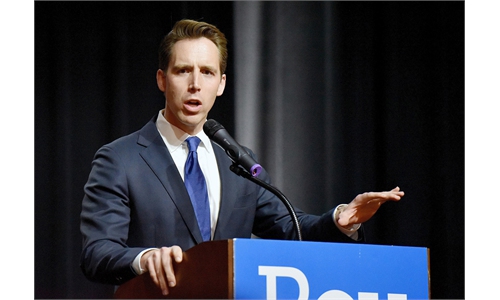Xi criticizes US rivalry policy in candid talk with Biden, warns over Taiwan question but both sides emphasize cooperation
Top Chinese leader directly criticizes US policy that sees China as rival

Photo:Xinhua
Chinese President Xi Jinping and US President Joe Biden spoke via telephone for over two hours on Thursday at a juncture of increased tension between China and the US due to the security situation around the Taiwan Straits and US House Speaker Nancy Pelosi's reported plan to visit the island of Taiwan.During the conversation with Xi, Biden reiterated that the one-China policy of the US has not changed and will not change, and that the US does not support "Taiwan independence."
Experts said the Xi-Biden talk is significant for the two great powers to manage their differences amid the serious tension, while it also sends a positive signal to the world that the two countries are still willing to cooperate with each other.
On the evening of July 28, Xi spoke with Biden on the phone at the request of the latter. The two presidents had a candid communication and exchange on China-US relations and issues of mutual interest, the Xinhua News Agency reported late Thursday evening.
Analysts said that according to the official information released about the Xi-Biden conversation, it is impressive that the Chinese leader is being very candid to directly criticize US policy on China, including its strategy that sees China as a "primary rival" and the US actions to push decoupling with China, and he also reaffirmed China's bottom line on Taiwan question. Xi warned Biden "those who play with fire will perish by it." Chinese experts said that the US politicians who intended to "play with fire" on the Taiwan question will sense great pressure after the conversation.
"The phone call shows China has always refused to define China-US relations as competitor as it will only lead to more tragedies. It is clear that the US view of China-US relations as competitor has led to evident misjudgments," a Beijing-based expert on foreign affairs told the Global Times on condition of anonymity.
It should be noted that cooperation is still at the core of the talk. China and the US can and should cooperate in many fields, the above-quoted expert said.
Against the backdrop of the complex and volatile international situation, China and the US should move their relations along the track of cooperation in a way that meets the common expectations and national interests of all countries, instead of positioning China as a strategic competitor and pushing China-US relations to a tragic path where competition is the bottom line, the expert said.
Chinese experts noted that the issue of tariffs was not mentioned in the Chinese press release although it was mentioned many times by the US media as a possible bargaining chip. The global economic situation and the international landscape are more important than the issue of tariffs. It reflects that China and the US could cooperate in a stable and anticipated direction and some US Congress members and media are being too shallow in how they interpret US-China relations. They fail to grasp the importance of the relations to the region and even the world.
Wills of cooperation
Xi pointed out that in the world today, the trends of turbulence and transformation are evolving, and deficits in development and security are looming large. Faced with a world of change and disorder, the international community and people around the world expect China and the US to take the lead in upholding world peace and security and in promoting global development and prosperity. This is the responsibility of China and the US as two major countries.
Biden said that the world is at a critical moment. US-China cooperation benefits not only the two peoples but also people of all countries. The US hopes to keep an open line of communication with China to enhance mutual understanding and avoid misperception and miscalculation, and will work with China where the interests of the two countries align and, at the same time, properly manage differences.
Jin Canrong, associate dean of the School of International Studies at the Renmin University of China, told the Global Times on Thursday that due to Pelosi's reported plan to visit Taiwan and the Chips and Science Act passed by the US Senate, China-US ties are getting more and more intense, but even under this situation, the two leaders can still have a conversation, so this is at least good for the two countries to stabilize and manage the tension.
The US economy shrank in the spring for the second consecutive quarter, meeting the criteria for a so-called technical recession as raging inflation and higher interest rates forced consumers and businesses to pull back on spending, Fox Business reported on Thursday.
Lü Xiang, an expert on US studies at the Chinese Academy of Social Sciences, told the Global Times on Thursday that when recession and inflation come at the same time, US policy to handle economic problems will become a "double-edged sword" as it would be really hard for the US to find a perfect solution that can effectively deal with the two problems.
Under such a difficult situation, the US needs to settle relations with other major powers, to create a better external environment for it to focus on fixing its own economic problems, but due to the toxic political atmosphere in the US, officials and politicians in Washington seems to prefer to secure their own positions by worsening ties with other major powers, Lü said.
"The economic pressure is a key reason why Biden desperately needs to talk with Chinese leader, and since the US side also expressed the will to cooperate and keep communication, we have confidence in the two sides keeping open frequent exchanges between senior officials," Jin said.
In fields like the urgent food crisis, and ones that Washington is willing to cooperate on like climate change and the COVID-19 pandemic, "we might be able to see some positive signs after the Xi-Biden talk, and the Biden administration might adjust tariffs due to inflation pressure," Jin noted.
The two presidents exchanged views on issues including the Ukraine crisis. Xi reiterated China's principled position.
Both presidents viewed their call as candid and in-depth. They agreed to stay in touch and instructed the two teams to keep up communication and cooperation, Xinhua reported.
Taiwan question
The Chinese president once again warned the US side about the seriousness and significance of the Taiwan question. Xi told Biden that the Taiwan question is crystal clear, and so are the facts and status quo that both sides of the Taiwan Straits belong to one and the same China. The three China-US joint communiqués embody the political commitments made by the two sides, and the one-China principle is the political foundation for China-US relations.
China firmly opposes separatist moves toward "Taiwan independence" and interference by external forces, and never allows any room for "Taiwan independence" forces in whatever form. The position of the Chinese government and people on the Taiwan question is consistent, and resolutely safeguarding China's national sovereignty and territorial integrity is the firm will of the more than 1.4 billion Chinese people, Xi noted.
"Public opinion cannot be defied. Those who play with fire will perish by it. It is hoped that the US will be clear-eyed about this," Xi said.
Jin said this is a clear and strong warning signal, adding to the warnings already sent out by the Chinese Ministry of Foreign Affairs and the Ministry of National Defense, so it is certain that if Pelosi insists on her provocative plan of visiting Taiwan, she will face serious and unbearable consequences.
Yang Xiyu, senior research fellow at the China Institute of International Studies, told the Global Times on Thursday that after the Xi-Biden telephone talk, attention should be focused on whether Pelosi would still go to the island of Taiwan.
"If Pelosi abandons her plan to visit Taiwan, then it would be a critical achievement of the talk between the two presidents, and this will set a stabilizer for China-US ties that releases a strong and positive signal to the world. But if she insists on going ahead with the plan, it would bring huge damage to China-US relations, and it will bring great uncertainty to the global political and economic situations," Yang said.
Biden and Pelosi are split over the speaker's potential trip to the island, as Pelosi is considering the midterm elections and her own political interests, while Biden must consider it from the perspective of the White House and be responsible for US national interests, analysts noted.
But experts also warned that China should not pin too much hope on the US side to restrict Pelosi's behavior, as the US has proved many times that it cannot keep its words, even when they have openly made promises to China time and again, so being prepared for the worst scenario, especially military preparation, is the best way for China to prevent or deter the situation from worsening.




